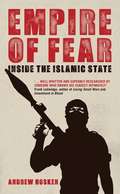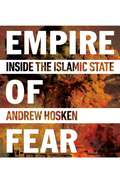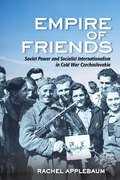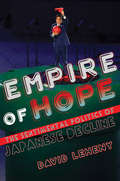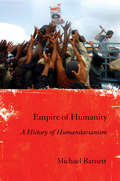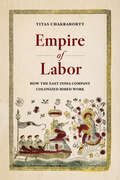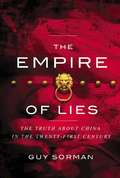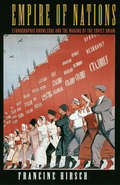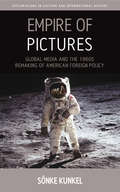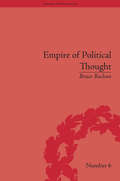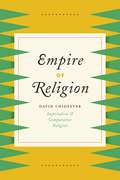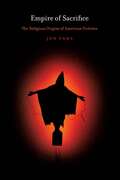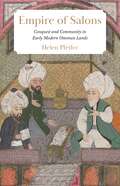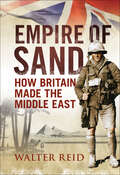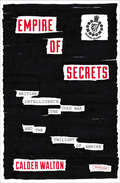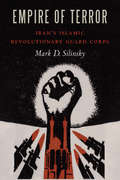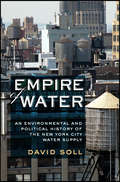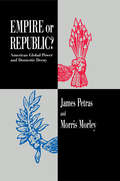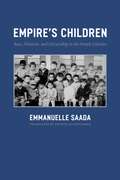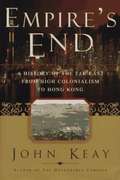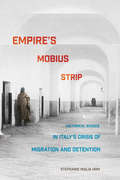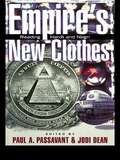- Table View
- List View
Empire of Fear: Inside the Islamic State
by Andrew HoskenIn June 2014 Islamic State launched an astonishing blitzkrieg which saw them seize control of an area in the Middle East the size of Britain. The news was soon filled with their relentless acts of savagery, yet nobody seemed to know who they were or where they'd come from.Now BBC reporter Andrew Hosken delivers the inside story on Islamic State. Through extensive first-hand reporting, Hosken builds a comprehensive picture of IS, their brutal ideology and exterminationist methods. Equally compelling and horrifying, Empire of Fear reveals how Islamic State came to be, explores how they might be defeated and asks a frightening question - if they were brought down, could we stop another group emerging to replace them?
Empire of Fear: Inside the Islamic State
by Andrew Hosken"A tremendously useful, insightful study of the frightening spread of a culture of death. Hosken does an excellent job of sorting out the American reaction, the failure of the Iraqi leadership in the form of Nouri al-Maliki and others, and how IS has becomes the richest terrorist group in the world. " -- Kirkus Reviews, (Starred) One of the 10 Best Books of September 2015 --The Christian Science Monitor In June 2014 Islamic State launched an astonishing blitzkrieg which saw them seize control of an area in the Middle East the size of Britain. The news was soon filled with their relentless acts of savagery, yet nobody seemed to know who they were or where they’d come from. Now BBC reporter Andrew Hosken delivers the inside story on Islamic State. Through extensive first-hand reporting, Hosken builds a comprehensive picture of IS, their brutal ideology and exterminationist methods. Equally compelling and horrifying, Empire of Fear reveals how Islamic State came to be, explores how they might be defeated and asks a frightening question - if they were brought down, could we stop another group emerging to replace them?
Empire of Friends: Soviet Power and Socialist Internationalism in Cold War Czechoslovakia
by Rachel ApplebaumThe familiar story of Soviet power in Cold War Eastern Europe focuses on political repression and military force. But in Empire of Friends, Rachel Applebaum shows how the Soviet Union simultaneously promoted a policy of transnational friendship with its Eastern Bloc satellites to create a cohesive socialist world. This friendship project resulted in a new type of imperial control based on cross-border contacts between ordinary citizens. In a new and fascinating story of cultural diplomacy, interpersonal relations, and the trade of consumer-goods, Applebaum tracks the rise and fall of the friendship project in Czechoslovakia, as the country evolved after World War II from the Soviet Union's most loyal satellite to its most rebellious.Throughout Eastern Europe, the friendship project shaped the most intimate aspects of people's lives, influencing everything from what they wore to where they traveled to whom they married. Applebaum argues that in Czechoslovakia, socialist friendship was surprisingly durable, capable of surviving the ravages of Stalinism and the Soviet invasion that crushed the 1968 Prague Spring. Eventually, the project became so successful that it undermined the very alliance it was designed to support: as Soviets and Czechoslovaks got to know one another, they discovered important cultural and political differences that contradicted propaganda about a cohesive socialist world. Empire of Friends reveals that the sphere of everyday life was central to the construction of the transnational socialist system in Eastern Europe—and, ultimately, its collapse.
Empire of Hope: The Sentimental Politics of Japanese Decline
by David LehenyEmpire of Hope asks how emotions become meaningful in political life. In a diverse array of cases from recent Japanese history, David Leheny shows how sentimental portrayals of the nation and its global role reflect a durable story of hopefulness about the country's postwar path. From the medical treatment of conjoined Vietnamese children, victims of Agent Orange, the global promotion of Japanese popular culture, a tragic maritime accident involving a US Navy submarine, to the 2011 tsunami and nuclear disaster, this story has shaped the way in which political figures, writers, officials, and observers have depicted what the nation feels.Expressions of national emotion do several things: they construct the boundaries of the national body, they inform and discipline appropriate expression, and they depoliticize messy problems that threaten to produce divisive questions about winners and losers. Most important, they work because they appear to be natural, simple and expected expressions of how the nation shares feeling, even when they paper over the extraordinary divergence in how the nation's citizens experience each incident. In making its arguments, Empire of Hope challenges how we read the relations between emotion and politics by arguing—unlike those who build from the neuroscientific turn in the social sciences or those developing affect theory in the humanities—that the focus should be on emotional representation rather than on emotion itself.
Empire of Humanity: A History of Humanitarianism
by Michael BarnettEmpire of Humanity explores humanitarianism’s remarkable growth from its humble origins in the early nineteenth century to its current prominence in global life. In contrast to most contemporary accounts of humanitarianism that concentrate on the last two decades, Michael Barnett ties the past to the present, connecting the antislavery and missionary movements of the nineteenth century to today’s peacebuilding missions, the Cold War interventions in places like Biafra and Cambodia to post–Cold War humanitarian operations in regions such as the Great Lakes of Africa and the Balkans; and the creation of the International Committee of the Red Cross in 1863 to the emergence of the major international humanitarian organizations of the twentieth century. Based on extensive archival work, close encounters with many of today’s leading international agencies, and interviews with dozens of aid workers in the field and at headquarters, Empire of Humanity provides a history that is both global and intimate. Avoiding both romanticism and cynicism, Empire of Humanity explores humanitarianism’s enduring themes, trends, and, most strikingly, ethical ambiguities. Humanitarianism hopes to change the world, but the world has left its mark on humanitarianism. Humanitarianism has undergone three distinct global ages—imperial, postcolonial, and liberal—each of which has shaped what humanitarianism can do and what it is. The world has produced not one humanitarianism, but instead varieties of humanitarianism. Furthermore, Barnett observes that the world of humanitarianism is divided between an emergency camp that wants to save lives and nothing else and an alchemist camp that wants to remove the causes of suffering. These camps offer different visions of what are the purpose and principles of humanitarianism, and, accordingly respond differently to the same global challenges and humanitarianism emergencies. Humanitarianism has developed a metropolis of global institutions of care, amounting to a global governance of humanity. This humanitarian governance, Barnett observes, is an empire of humanity: it exercises power over the very individuals it hopes to emancipate. Although many use humanitarianism as a symbol of moral progress, Barnett provocatively argues that humanitarianism has undergone its most impressive gains after moments of radical inhumanity, when the "international community" believes that it must atone for its sins and reduce the breach between what we do and who we think we are. Humanitarianism is not only about the needs of its beneficiaries; it also is about the needs of the compassionate.
Empire of Labor: How the East India Company Colonized Hired Work
by Titas ChakrabortyEmpire of Labor tells the story of how hired workers experienced and responded to the rise to power over the long eighteenth century of the English East India Company (EIC), which perennially hired thousands of people in and around its settlements in Bengal. Focusing on boatmen and silk reelers as well as sailors and soldiers—a remarkable look at both indigenous and European workers—the story begins with the earliest accounts of the EIC's dealings with hired labor in the region, from 1651. Prior to EIC dominance, hired workers drove hard bargains with their employers, making demands that drew upon their own notions of wages, work rhythms, and time. When their demands were not met, they ran away, often to rival indigenous or European employers. Empire of Labor explores these demands and how they conflicted with the EIC's notions of discipline. Analyzing Bengali literary sources and Dutch and English archival materials, the book rethinks the ascendancy of the company state as a violent process involving removing competing employers, imposing army and police power, introducing new production technologies, and instituting draconian regulations which eliminated indigenous cultures of work. Most importantly, it depicts the lifeworlds of these recalcitrant workers, showing how they lived and resisted. A major intervention in histories of colonialism, labor, migration, and law, Empire of Labor ultimately recasts colonial rule as a novel form of state-labor relationship.
Empire of Lies
by Guy SormanBefore the totalitarian reign of Mao Zedong and his immediate successors, never in human history had an entire nation been under such intense surveillance. The Chinese not only had to speak alike; they had to think alike. Traveling to China regularly since 1967, and spending all of 2005 and 2006 there, Guy Sorman saw it all, and in this jaw-dropping book, he documents the horrifying stories of China through the 21st century. He shows how the Party's primary concern is not improving the lives of the downtrodden; it seeks power more than it seeks social development. It expends extraordinary energy in suppressing Chinese freedoms-the media operate under suffocating censorship, and political opposition can result in expulsion or prison-even as it tries to seduce the West, which has conferred greater legitimacy on it than do the Chinese themselves.
Empire of Nations: Ethnographic Knowledge and the Making of the Soviet Union
by Francine HirschWhen the Bolsheviks seized power in 1917, they set themselves the task of building socialism in the vast landscape of the former Russian Empire, a territory populated by hundreds of different peoples belonging to a multitude of linguistic, religious, and ethnic groups. Before 1917, the Bolsheviks had called for the national self-determination of all peoples and had condemned all forms of colonization as exploitative. After attaining power, however, they began to express concern that it would not be possible for Soviet Russia to survive without the cotton of Turkestan and the oil of the Caucasus. In an effort to reconcile their anti-imperialist position with their desire to hold on to as much territory as possible, the Bolsheviks integrated the national idea into the administrative-territorial structure of the new Soviet state. In Empire of Nations, Francine Hirsch examines the ways in which former imperial ethnographers and local elites provided the Bolsheviks with ethnographic knowledge that shaped the very formation of the new Soviet Union. The ethnographers--who drew inspiration from the Western European colonial context--produced all-union censuses, assisted government commissions charged with delimiting the USSR's internal borders, led expeditions to study "the human being as a productive force," and created ethnographic exhibits about the "Peoples of the USSR." In the 1930s, they would lead the Soviet campaign against Nazi race theories . Hirsch illuminates the pervasive tension between the colonial-economic and ethnographic definitions of Soviet territory; this tension informed Soviet social, economic, and administrative structures. A major contribution to the history of Russia and the Soviet Union, Empire of Nations also offers new insights into the connection between ethnography and empire.
Empire of Pictures: Global Media and the 1960s Remaking of American Foreign Policy (Explorations in Culture and International History #8)
by Sönke KunkelIn Cold War historiography, the 1960s are often described as a decade of mounting diplomatic tensions and international social unrest. <P><P>At the same time, they were a period of global media revolution: communication satellites compressed time and space, television spread around the world, and images circulated through print media in expanding ways. <P><P>Examining how U.S. policymakers exploited these changes, this book offers groundbreaking international research into the visual media battles that shaped America's Cold War from West Germany and India to Tanzania and Argentina.
Empire of Political Thought: Indigenous Australians and the Language of Colonial Government (Empires in Perspective #6)
by Bruce BuchanA book about how European colonists in Australia represented the Indigenous peoples they found there, and the tasks of governing them within the terms of Western political thought. It emphasises how the framework of ideas drawn from the traditions of Western political thought was employed in the imperial government of Indigenous peoples.
Empire of Religion: Imperialism and Comparative Religion
by David ChidesterHow is knowledge about religion and religions produced, and how is that knowledge authenticated and circulated? David Chidester seeks to answer these questions in Empire of Religion, documenting and analyzing the emergence of a science of comparative religion in Great Britain during the second half of the nineteenth century and its complex relations to the colonial situation in southern Africa. In the process, Chidester provides a counterhistory of the academic study of religion, an alternative to standard accounts that have failed to link the field of comparative religion with either the power relations or the historical contingencies of the imperial project. In developing a material history of the study of religion, Chidester documents the importance of African religion, the persistence of the divide between savagery and civilization, and the salience of mediations--imperial, colonial, and indigenous--in which knowledge about religions was produced. He then identifies the recurrence of these mediations in a number of case studies, including Friedrich Max Müller’s dependence on colonial experts, H. Rider Haggard and John Buchan’s fictional accounts of African religion, and W. E. B. Du Bois’s studies of African religion. By reclaiming these theorists for this history, Chidester shows that race, rather than theology, was formative in the emerging study of religion in Europe and North America. Sure to be controversial, Empire of Religion is a major contribution to the field of comparative religious studies.
Empire of Sacrifice: The Religious Origins of American Violence
by Jon PahlIt is widely recognized that American culture is both exceptionally religious and exceptionally violent. Americans participate in religious communities in high numbers, yet American citizens also own guns at rates far beyond those of citizens in other industrialized nations. Since 9/11, United States scholars have understandably discussed religious violence in terms of terrorist acts, a focus that follows United States policy. Yet, according to Jon Pahl, to identify religious violence only with terrorism fails to address the long history of American violence rooted in religion throughout the country’s history. In essence, Americans have found ways to consider blessed some very brutal attitudes and behaviors both domestically and globally.In Empire of Sacrifice, Pahl explains how both of these distinctive features of American culture work together by exploring how constructions along the lines of age, race, and gender have operated to centralize cultural power across American civil or cultural religions in ways that don’t always appear to be "religious" at all. Pahl traces the development of these forms of systemic violence throughout American history, using evidence from popular culture, including movies such as Rebel without a Cause and Reefer Madness and works of literature such as The Narrative of the Life of Frederick Douglass and The Handmaid's Tale, to illuminate historical events. Throughout, Pahl focuses an intense light on the complex and durable interactions between religion and violence in American history, from Puritan Boston to George W. Bush’s Baghdad.
Empire of Salons: Conquest and Community in Early Modern Ottoman Lands
by Helen PfeiferA history of the Ottoman incorporation of Arab lands that shows how gentlemanly salons shaped culture, society, and governanceHistorians have typically linked Ottoman imperial cohesion in the sixteenth century to the bureaucracy or the sultan’s court. In Empire of Salons, Helen Pfeifer points instead to a critical but overlooked factor: gentlemanly salons. Pfeifer demonstrates that salons—exclusive assemblies in which elite men displayed their knowledge and status—contributed as much as any formal institution to the empire’s political stability. These key laboratories of Ottoman culture, society, and politics helped men to build relationships and exchange ideas across the far-flung Ottoman lands. Pfeifer shows that salons played a central role in Syria and Egypt’s integration into the empire after the conquest of 1516–17.Pfeifer anchors her narrative in the life and network of the star scholar of sixteenth-century Damascus, Badr al-Din al-Ghazzi (d. 1577), and she reveals that Arab elites were more influential within the empire than previously recognized. Their local knowledge and scholarly expertise competed with, and occasionally even outshone, that of the most powerful officials from Istanbul. Ultimately, Ottoman culture of the era was forged collaboratively, by Arab and Turkophone actors alike.Drawing on a range of Arabic and Ottoman Turkish sources, Empire of Salons illustrates the extent to which magnificent gatherings of Ottoman gentlemen contributed to the culture and governance of empire.
Empire of Sand: How Britain Made the Middle East
by Walter Reid&“A story of how empires rattle along until their sheer scale makes them nonsensical . . . [Reid&’s] very capable prose just begs to be read&” (The Scotsman). At the end of the First World War, Britain, and to a much lesser extent France, created the modern Middle East. The possessions of the former Ottoman Empire were carved up with scant regard for the wishes of those who lived there. Frontiers were devised and alien dynasties imposed on the populations as arbitrarily as in medieval times. From the outset, the project was destined to fail. Conflicting and ambiguous promises had been made to the Arabs during the war but were not honored. Brief hopes for Arab unity were dashed, and a harsh belief in western perfidy persists to the present day. Britain was quick to see the riches promised by the black pools of oil that lay on the ground around Baghdad. When France, too, grasped their importance, bitter differences opened up and the area became the focus of a return to traditional enmity. The wartime allies came close to blows and then drifted apart, leaving a vacuum of which Hitler took advantage. Working from both primary and secondary sources, Walter Reid explores Britain&’s role in the creation of the modern Middle East and the rise of Zionism from the early years of the twentieth century to 1948, when Britain handed over Palestine to United Nationns control. From the decisions that Britain made has flowed much of the instability of the region and of the worldwide tensions that threaten the twenty-first century; this thought-provoking book considers how much Britain was to blame.
Empire of Secrets: British Intelligence, the Cold War, and the Twilight of Empire
by Calder WaltonThe renowned espionage historian offers &“a gripping account of British intelligence during the last days of empire&” (The Daily Telegraph). Drawing on a wealth of newly declassified records and hitherto overlooked personal papers, intelligence expert Calder Walton offers a compelling and authoritative history of Britain&’s espionage activities after World War II. A major addition to intelligence literature, this is the first book to utilize records from the Foreign Office&’s secret archive, which contains some of the darkest and most shameful secrets from the last days of Britain&’s empire. Working clandestinely, MI5 operatives helped to prop up newly independent states across the globe against a ceaseless campaign of Communist subversion. Though the CIA is often assumed to be the principal actor against the Soviet Union through the Cold War, Britain plays a key role through its so-called &“special relationship&” with the United States. In Empire of Secrets, Walton sheds new light on everything from violent counterinsurgencies fought by British forces in the jungles of Malaya and Kenya, to urban warfare campaigns conducted in Palestine and the Arabian Peninsula. The stories here have chilling contemporary resonance, detailing the use and abuse of intelligence by governments that oversaw state-sanctioned terrorism, wartime rendition, and &“enhanced&” interrogation. &“An important and highly original account of postwar British intelligence.&” —The Wall Street Journal
Empire of Terror: Iran's Islamic Revolutionary Guard Corps
by Mark D. SilinskyIn Empire of Terror Mark D. Silinsky argues that Iran is one of the United States&’ deadliest enemies. The Islamic Revolutionary Guard Corps, known as the Guards, bring Iran&’s sway over much of the greater Middle East and pose a growing existential threat to Western security. Providing insights gained from his thirty-eight years as an analyst in the U.S. defense intelligence community, Silinsky argues that Iran&’s political leaders and Guards are animated by aggressive, unforgiving, and totalitarian principles. He draws historical parallels to the Soviet Union and Nazi Germany to compare the intelligence and security services of states with totalitarian aspirations and to illustrate ideological points of intersection—a collectivist mindset, intolerance for political deviation, strongly defined sex roles and hypermasculinity, and a ruthless determination to ferret out and destroy their enemies. Silinsky offers biographies and explanations of the ideology that propels some of Iran&’s leaders, with global implications. Profiling the perpetrators, victims, heroes, villains, and dupes, Silinsky shines light on the human and inhumane elements in this distinctly Iranian drama. Although the Soviet Union and Nazi Germany have been defeated and belong to history, the Iranian threat is very much alive.
Empire of Water: An Environmental and Political History of the New York City Water Supply
by David SollSupplying water to millions is not simply an engineering and logistical challenge. As David Soll shows in his finely observed history of the nation's largest municipal water system, the task of providing water to New Yorkers transformed the natural and built environment of the city, its suburbs, and distant rural watersheds. Almost as soon as New York City completed its first municipal water system in 1842, it began to expand the network, eventually reaching far into the Catskill Mountains, more than one hundred miles from the city. Empire of Water explores the history of New York City's water system from the late nineteenth century to the early twenty-first century, focusing on the geographical, environmental, and political repercussions of the city's search for more water.Soll vividly recounts the profound environmental implications for both city and countryside. Some of the region's most prominent landmarks, such as the High Bridge across the Harlem River, Central Park's Great Lawn, and the Ashokan Reservoir in Ulster County, have their origins in the city's water system. By tracing the evolution of the city's water conservation efforts and watershed management regime, Soll reveals the tremendous shifts in environmental practices and consciousness that occurred during the twentieth century. Few episodes better capture the long-standing upstate-downstate divide in New York than the story of how mountain water came to flow from spigots in Brooklyn and Manhattan.Soll concludes by focusing on the landmark watershed protection agreement signed in 1997 between the city, watershed residents, environmental organizations, and the state and federal governments. After decades of rancor between the city and Catskill residents, the two sides set aside their differences to forge a new model of environmental stewardship. His account of this unlikely environmental success story offers a behind the scenes perspective on the nation's most ambitious and wide-ranging watershed protection program.
Empire of the Air
by Jenifer Van VleckJenifer Van Vleck's fascinating history reveals the central role commercial aviation played in the United States' ascent to global preeminence in the twentieth century. As U. S. military and economic influence grew, the federal government partnered with the aviation industry to deliver American power across the globe and to sell the idea of the "American Century" to the public at home and abroad. The airplane promised to extend the frontiers of the United States "to infinity," as Pan American World Airways president Juan Trippe said. As it accelerated the global circulation of U. S. capital, consumer goods, technologies, weapons, popular culture, and expertise, few places remained distant from Wall Street and Washington. Aviation promised to secure a new type of empire--an empire of the air instead of the land, which emphasized access to markets rather than the conquest of territory and made the entire world America's sphere of influence. By the late 1960s, however, foreign airlines and governments were challenging America's control of global airways, and the domestic aviation industry hit turbulent times. Just as the history of commercial aviation helps to explain the ascendance of American power, its subsequent challenges reflect the limits and contradictions of the American Century.
Empire or Republic?: American Global Power and Domestic Decay
by Morris Morley James PetrasEmpire or Republic? makes the necessary, but much overlooked, link between our nation's international policies and the domestic situation. The authors contend that the Reagan, Bush and Clinton administrations have all focused on global leadership to the detriment of pressing social, economic and political problems at home.
Empire's Ally
by Greg Albo Jerome KlassenThe war in Afghanistan has been a major policy commitment and central undertaking of the Canadian state since 2001: Canada has been a leading force in the war, and has spent hundreds of millions of dollars on aid and reconstruction. After a decade of conflict, however, there is considerable debate about the efficacy of the mission, as well as calls to reassess Canada's role in the conflict. An authoritative and strongly analytical work, Empire's Ally provides a much-needed critical investigation into one of the most polarizing events of our time.This collection draws on new primary evidence - including government documents, think tank and NGO reports, international media files, and interviews in Afghanistan - to provide context for Canadian foreign policy, to offer critical perspectives on the war itself, and to link the conflict to broader issues of political economy, international relations, and Canada's role on the world stage. Spanning academic and public debates, Empire's Ally opens a new line of argument on why the mission has entered a stage of crisis.
Empire's Children
by Ellen BoucherBetween 1869 and 1967, government-funded British charities sent nearly 100,000 British children to start new lives in the settler empire. This pioneering study tells the story of the rise and fall of child emigration to Canada, Australia, New Zealand, and Southern Rhodesia. In the mid-Victorian period, the book reveals, the concept of a global British race had a profound impact on the practice of charity work, the evolution of child welfare, and the experiences of poor children. During the twentieth century, however, rising nationalism in the dominions, alongside the emergence of new, psychological theories of child welfare, eroded faith in the 'British world' and brought child emigration into question. Combining archival sources with original oral histories, Empire's Children not only explores the powerful influence of empire on child-centered social policy, it also uncovers how the lives of ordinary children and families were forever transformed by imperial forces and settler nationalism.
Empire's Children: Race, Filiation, and Citizenship in the French Colonies
by Arthur Goldhammer Emmanuelle SaadaEurope's imperial projects were often predicated on a series of legal and scientific distinctions that were frequently challenged by the reality of social and sexual interactions between the colonized and the colonizers. When Emmanuelle Saada discovered a 1928 decree defining the status of persons of mixed parentage born in French Indochina - the metis - she found not only a remarkable artifact of colonial rule, but a legal bombshell that introduced race into French law for the first time. The decree was the culmination of a decades-long effort to resolve the metis question: the educational, social, and civil issues surrounding the mixed population. Operating at the intersection of history, anthropology, and law, Empire's Children reveals the unacknowledged but central role of race in the definition of French nationality. Through extensive archival work in both France and Vietnam, and a close reading of primary and secondary material from the Pacific islands and sub-Saharan and North Africa, Saada has created in Empire's Children an original and compelling perspective on colonialism, law, race, and culture from the end of the nineteenth century until decolonization.
Empire's End: A History of the Far East from High Colonialism to Hong Kong
by John KeayBritish colonial history.
Empire's Mobius Strip: Historical Echoes in Italy's Crisis of Migration and Detention
by Stephanie Malia HomItaly's current crisis of Mediterranean migration and detention has its roots in early twentieth century imperial ambitions. Empire's Mobius Strip investigates how mobile populations were perceived to be major threats to Italian colonization, and how the state's historical mechanisms of control have resurfaced, with greater force, in today's refugee crisis.What is at stake in Empire's Mobius Strip is a deeper understanding of the forces driving those who move by choice and those who are moved. Stephanie Malia Hom focuses on Libya, considered Italy's most valuable colony, both politically and economically. Often perceived as the least of the great powers, Italian imperialism has been framed as something of "colonialism lite." But Italian colonizers carried out genocide between 1929–33, targeting nomadic Bedouin and marching almost 100,000 of them across the desert, incarcerating them in camps where more than half who entered died, simply because the Italians considered their way of life suspect. There are uncanny echoes with the situation of the Roma and migrants today. Hom explores three sites, in novella-like essays, where Italy's colonial past touches down in the present: the island, the camp, and the village.Empire's Mobius Strip brings into relief Italy's shifting constellations of mobility and empire, giving them space to surface, submerge, stretch out across time, and fold back on themselves like a Mobius strip. It deftly shows that mobility forges lasting connections between colonial imperialism and neoliberal empire, establishing Italy as a key site for the study of imperial formations in Europe and the Mediterranean.
Empire's New Clothes: Reading Hardt and Negri
by Jodi Dean Paul A. PassavantFirst published in 2004. Routledge is an imprint of Taylor & Francis, an informa company.
